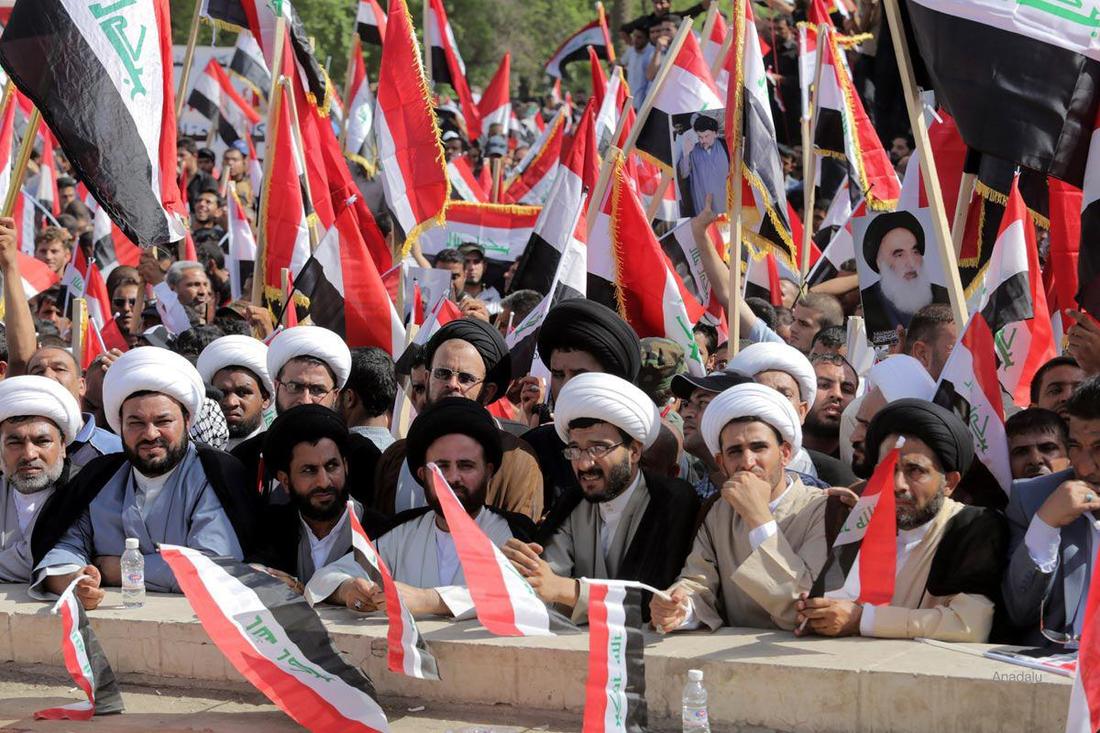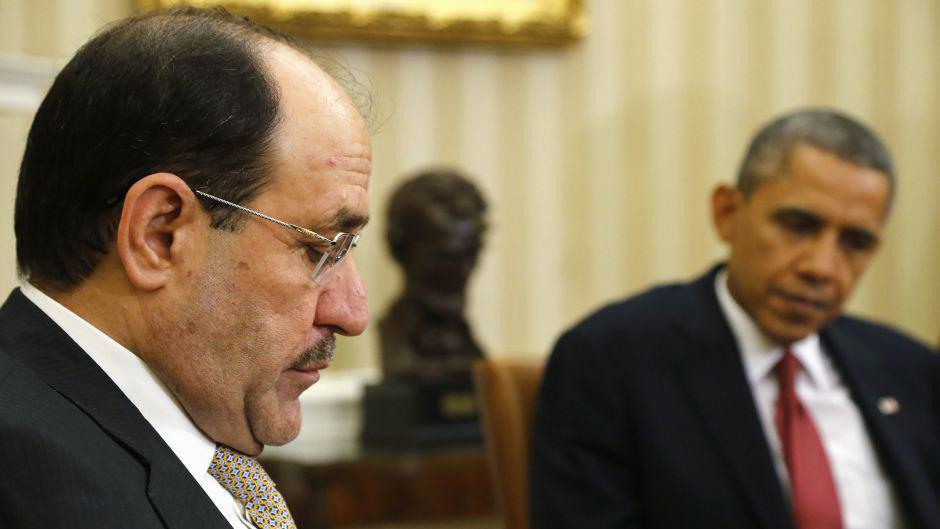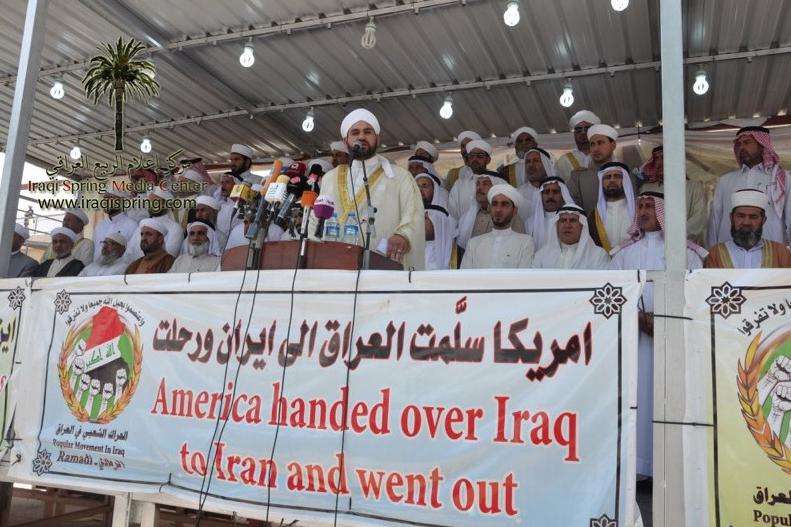Power sharing mechanisms and structures imposed by occupational forces were unsympathetic of the diverse civilizational and ethnic tapestry by which Iraq is known. The lines of political difference drawn, divided a once unified populace, whose freedoms were stifled beneath clerical rule, before being led down the road of empty promises.
Against this backdrop, the dismemberment of the state is ongoing. Fourteen years since America’s invasion, and those in power are still fumbling and flailing. Their impossible task is to stitch back together the severed limbs of the Iraqi state. Each limb is ascribed to a different custodian, united only by the seats they secured with US approval. What remains is a silhouette of a collapsed system. Today’s failures are suggestive of unlearned lessons, starting with America’s ambitious plot to topple Saddam Hussein. The task — without the co-optation of men America called ‘the Iraqi opposition’, would have been impossible. “Well disposed toward the united States” — as Foreign Policy Magazine described them at the time — these men are the ruling political class in Iraq.
Even 14 years after Saddam’s passing, their plans for effective governance and constitutional order are no clearer. The opposition parties Washington cherry picked were chosen not for what they stood for but who they stood against: Saddam. The intelligence they offered was not only proven spurious, the power they received in exchange of spun facts exposed the largest of these groups — the Iraqi Governing Council — as a US quisling. Commitment to America’s imperialist designs also secured the Iraqi National Council and Kurdish parties permanent seats in power as America’s main clients until the present day. Their sponsorship by invading forces has gone down in history as the biggest betrayal of Iraq’s people — unconsulted till present over the fate of their nation state.
Before reconstruction could begin military rule by occupant troops first needed to end. Though this would take 9 years, business was to continue as planned. During the initial years of America’s unlawful reconstruction programmes, the upper hand was secured by US, British and later Chinese firms. Despite a delayed entrance on the economic scene, Chinese companies, emerged on top; “the biggest beneficiary of this post-Saddam oil boom” — as described by the NYT — the cheaper and therefore favourable choice for a bankrupt government. By accepting lower profits, Chinese state companies outbid Anglo-American firms.
The Chinese were not only exempt from the costs of war, convicts were also recycled and shipped to Iraq to keep the costs of China’s oversea infrastructural operations low. A cost was to be paid however. In accepting a lower profit margin and acquiescing to the demands of the Iraqi state, Chinese-led projects were poorly executed. Little did this matter so long as Baghdad secured investments and Beijing obtained the revenue it eagerly needs to feed its ever-expanding population. Studies conducted by the Financial Times put profits earned by top 10 foreign firms at $72 billion. Halliburton’s subsidiary Kellogg Brown and Root, secured $39.5bn in federal contracts over the space of a decade. Once America’s Coalitional Provisional Authority (CPA) — a transitional defacto government — seized control of the local economy, it began Iraq’s steady descent into hell. CPA policies, unlawful privatization and fiscal mismanagement unfastened the backdoor to foreign contractors. Invites were later also sent to Kuwaiti, UAE, Iranian and Turkish firms.
Iraq did not suffer any shortage of local firms or qualified staff capable of administering infrastructural building. The CPA did not stop at their exclusion. It went as far as freezing the assets and selling the inventories of local firms. Against these facts, reassurances of shared sovereignty between the CPA and the newly returned exiled class amounted to nothing, neither then or now. For years America has sugarcoated its failures — old and new — as ‘unintended’ or ‘controversial decisions’ while the intended outcome, as witnessed, has locked Iraq into a relationship of dependency with foreign donors. Fourteen years after Paul Wolfowitz former US deputy defence secretary told the world that Iraq “can really finance its own reconstruction, and relatively soon”, Iraq’s people are still waiting.
Fiscal mismanagement was further matched by political incompetence and promises that never took root. America instead aligned itself to self-described men of faith and pseudo politicians in forming an Islamic Shia majority government. The holy communion America entered into with turbaned men is the biggest set back Iraq has faced in the last decade. The old government was capsized, leaving
450 000 adult men jobless, from the low ranking civil servant to the high ranking army colonel, under US-imposed De-Baathification. Its issuance dissolved Iraq’s security forces, dismissing not only military personnel from their jobs but also government affiliated post. The order has been continuously exploited by the state to dismiss any perceived challenge.
Despite this, the world was still sold the lie that minority rule was rightfully reversed. The willful exclusion of Sunni faces notorious for their anti-occupation position was not so much America rectifying injustices of the past. Sunni exclusion lay at the heart of a game plan, whereby America collaborated only with willing compatriots. By way of submission, they would be free to take up residency in Iraq’s dismantled institutions, without paving America’s road with unexpected surprises. But all that America hoped would not occur did.
As Iraq-familiar scholars warned, multiple insurgencies — Sunni and Shia — formed to drive what the indigenous community widely viewed as invading forces. It was made clear that they had not come as liberators. The main claimants of power were cherry picked according to America’s orientalist imagination of Iraq’s communal makeup. The ignorance America proudly wore was also exploited by new household names in politics. A line drafted in a document released by the United Iraqi Alliance in 2005 best depicts this; ‘Iraq is the Shi’a … And the Shi’a are Iraq’. While this espoused ideology is shared among members of the governing elite, many are divided over how to divide the spoils of war.
Although America’s romance between Kurdish and Shi’i political forces was activated a decade earlier, the opportunities 2003 invited along were too good for deferment to have been an option considered by power elites-in-waiting. It is logical therefore, to see that Sunni rejection of Iraq’s post-2003 system is predicated on more than discord over the manifest identity of the state. This is a point of contention, but more important than that is the refusal to accept the terms Bush imposed on Iraq. Fourteen years ago on Apr. 10, Bush promised Iraq that America would not “stop until Saddam’s corrupt gang is gone … You deserve better than tyranny and corruption’.
As political competition hots up in the run up to the elections, America find itself drowned by a similar predicament; a lack of Sunni actors other than Islamic Party (IP) members willing to accept the political process. The rejection is not fueled by an insatiable appetite to occupy the biggest seats in power, but by a US and Iran propped state.
Acceptance or entry into a process whereby institutions cannot serve their most basic functions, honesty costs you your profession, and where sovereignty assumes mythical dimensions, only dresses the wound but does nothing to heal it. Beyond the scourge of terrorism, the dismemberment of the state and the search for persuadable Sunnis are the biggest obstacles stood in the way of America’s objectives.
While America’s ill thought plans have alienated all the anti-occupation Sunnis it has tried to bring under its yolk, one ‘Sunni’ party remains loyal (in contrast with the 5 Shia parties). This is not surprising given the fact that the Islamic Party (banned under Saddam) has willingly collaborated with America, as an actor willing to play by the American playbook. The acceptance of its terms and condition by one faction of Sunni, does not redress the problems Sunnis face daily.
The unchanged reality since 2003 is that the establishment of party politics predicated on sect, simply does not work. Until America accepts this hard-to-swallow truth, its search for unreliable patrons continues. By keeping its game alive, America has achieved exactly that which it tried to avoid: increased regional conflict and the Iranian takeover of Iraq. Turning over a new leaf will necessitate the abandonment of this game, reengagement with existing Sunni actors to counterweight Iran’s influence. Without isolating the Iranian factor — including parties cultivated by Iran — America can only expect the same results that have coloured the history of its failed intervention in Iraq.




 RSS Feed
RSS Feed